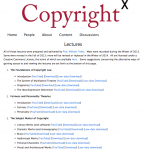Plaintiffs, twenty-three professional football players, filed a putative class action against the NFL, claiming that films produced by NFL-affiliate NFL Films violated the players’ rights under the right-of-publicity laws of various states as well as their rights under the Lanham Act, 15 U.S.C. 1125. Twenty plaintiffs settled, but appellants elected to opt out of the settlement and pursued individual right-of-publicity and Lanham Act claims. The district court granted summary judgment for the NFL. Applying the three Porous Media Corp. v. Pall Corp., factors, the court agreed with the district court’s conclusion that the films are expressive, rather than commercial, speech and that the Copyright Act, 17 U.S.C. 301(a), therefore preempts appellants’ claims. The court also concluded that appellants’ claim of false endorsement under the Lanham Act fails as a matter of law because appellants provide no evidence that the films contain misleading or false statements regarding their current endorsement of the NFL. Accordingly, the court affirmed the judgment. View “Dryer v. National Football League” on Justia Law

How much of a photo do you need to alter to avoid copyright infringement? Hint: Cheshire Cat
Bloggers and artists often ask, “how much of a photo do you need to alter to avoid copyright infringement?” Five changes? Fifteen? The Seventh Circuit addressed the issue in the Kienitz v Sconnie Nation case recently. According to the court, Sconnie Nation made t-shirts displaying an image of Madison Wisconsin mayor Paul Soglin, using […]


